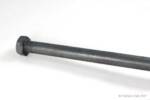Newest FAQs
Yes. Per the RCSC Specification for Structural Joints Using High-Strength Bolts (2014), section 8.2, it says: “When it is impractical to turn the nut, pretensioning by turning the bolt head is permitted while the rotation of the nut is prevented, provided that the washer requirements in Section 6.2 are met”
If a purchaser specifies an ASTM F844 washer with the dimensions of Portland Bolt’s plate washers, then the washers do meet the requirements of F844. According to ASTM F844, a specification for general use steel washers, the washer dimensions must conform to ASME B18.21.1, Type A, Tables 1A and Tables 1B, unless otherwise specified. The... Read more
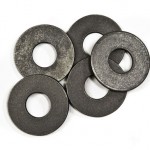
A standard hex nut, also referred to as a finished hex nut, has a smaller width across the flats and corners compared to a heavy hex nut, and a heavy hex nut is slightly thicker than a standard hex nut of the same nominal size. In fact, heavy hex nuts are exactly a 1/8” larger... Read more
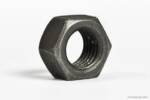
The United States Rural Utilities Service (RUS) is in charge of administering programs that provide rural communities with infrastructure or infrastructure improvements. The programs administered by the RUS include water and waste treatment, electric power, and telecommunications services. The RUS is a part of the USDA Rural Development Agency of the United States Department of Agriculture. The RUS provides assistance... Read more
Although ASME B18.2.1 allows for reduced body diameter bolts (where the unthreaded shank is equal to the pitch diameter of the threads), the American Wood Council does not. In Section 13.1.3.3 of the 2015 National Design Specification for Wood Construction, it says: “Bolts used with split ring and shear plate connectors… shall have an unreduced... Read more
Hex and heavy hex coupling nuts can be made in custom lengths. Depending on the size and grade, however, there may be an extended lead time associated with doing that. Off-the-shelf coupling nut lengths have fairly few options for a given diameter. As long as the coupling nut is long enough to achieve the desired thread... Read more

In general substituting one grade of fastener for another is a bad idea, as that substitution can open you up to liability concerns, but does this apply to washers? ASTM F844 covers standard, unhardened steel washers for general use. ASTM F436 covers hardened steel washers used with most high strength bolts and F1554 anchor bolts. F844 is... Read more
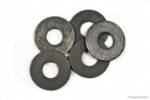
A36M55 is an outdated call out for anchor bolts primarily used by the light pole and traffic signal industries. It was used to specify ASTM A36 steel (36 ksi yield strength) that had been chemically modified to develop a minimum 55 ksi yield strength. In 1994 the F1554 specification was introduced, and F1554 Grade 55... Read more

A takeoff is a list of all the materials required to build a project based on the supplied plans. For example, if you had plans for building a dock, the plans might show a typical section of dock and you would use that to extrapolate how many board feet of timber and how many bolts... Read more
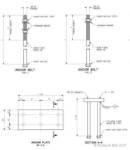
From time to time our friendly estimators may mention that we are going to make your order using bolt blanks. But what is a bolt blank? In order to help facilitate small runs of custom bolts and rush orders, Portland Bolt stocks bolt blanks. Bolt blanks are headed bolts that have not been threaded yet.... Read more
